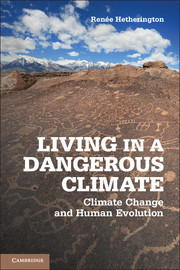Book contents
- Frontmatter
- Contents
- Figures
- Tables
- Foreword: Evolution and the Human Condition
- Acknowledgments
- Preface
- Earth’s Climate
- The Evolution of the Homo Species
- Climate and Human Migration
- Climate and Agriculture
- 7 Agriculture and the Rise of Civilization
- 8 The Maya Civilization and Beyond
- The Dominant Paradigm
- Today and Tomorrow
- The Economic Connection
- Dangerous Attitudes
- Living in Dangerous Times
- Glossary
- Notes
- Index
7 - Agriculture and the Rise of Civilization
Published online by Cambridge University Press: 05 June 2012
- Frontmatter
- Contents
- Figures
- Tables
- Foreword: Evolution and the Human Condition
- Acknowledgments
- Preface
- Earth’s Climate
- The Evolution of the Homo Species
- Climate and Human Migration
- Climate and Agriculture
- 7 Agriculture and the Rise of Civilization
- 8 The Maya Civilization and Beyond
- The Dominant Paradigm
- Today and Tomorrow
- The Economic Connection
- Dangerous Attitudes
- Living in Dangerous Times
- Glossary
- Notes
- Index
Summary
There is no escape from agriculture except into mass starvation,
and it has often led there anyway, with drought and blight.
Ronald Wright, A Short History of ProgressOur early hunter-gatherer ancestors lived in isolated territories. One might think that, over time, their expanding populations would have exhausted resources in their territories and led them to develop agriculture, but the archaeological evidence does not support this view. Instead, hunter-gatherers practiced birth control by delaying the weaning of their children or, during the worst of times, killing the children or migrating elsewhere.
Today there is ample evidence of farming societies encroaching on the territories of hunter-gatherers and compelling them to switch to farming. There are many cases where traditional hunting and gathering grounds have been wiped out by deforestation for lumber, agriculture, or access to mineral resources. Yet these circumstances did not apply when agriculture first came into being.
Life also seems to have been a lot more leisurely for small groups of hunter-gatherers than for farmers , who had to work long hours to gain the same nutritional benefi ts. So making the transition to agriculture did not happen because it was less work or more fun. When resources became limited in their territories, hunter-gatherers just moved to more suitable environments, something quite possible when populations were small. There was no apparent time or energy benefi t that would have encouraged them to switch to agriculture. What triggered the shift?
- Type
- Chapter
- Information
- Living in a Dangerous ClimateClimate Change and Human Evolution, pp. 73 - 87Publisher: Cambridge University PressPrint publication year: 2012



